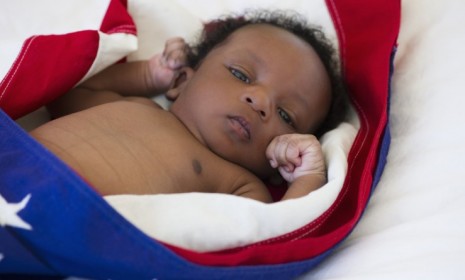The historic growth in non-white births: 4 consequences
As of July, 2011, fewer white babies were being born in the U.S. than minority babies. What does our changing national makeup mean for our future?

A free daily email with the biggest news stories of the day – and the best features from TheWeek.com
You are now subscribed
Your newsletter sign-up was successful
For the first time in U.S. history, we've experienced a year in which fewer white babies were born than minority babies. The change, recorded in the 12 months ending last July, was not unexpected given long-standing demographic trends. But in a nation that was founded by white Europeans and has struggled with issues of race ever since, the milestone could have far-reaching implications. Here, four theories on what this means for the future of America:
1. We must improve minority educational opportunities
A college degree is "the most important building block of success in today's economy," says Sabrina Tavernise in The New York Times. "But blacks and Latinos lag far behind whites in getting one," with just 13 percent of Latinos and 18 percent of blacks earning college degrees, compared to 31 percent of whites. "We do a pretty lousy job of educating the younger generation of minorities," Ruy Teixeira, a senior fellow at the Center for American Progress, tells the Times. "Basically, we are not ready for this."
The Week
Escape your echo chamber. Get the facts behind the news, plus analysis from multiple perspectives.

Sign up for The Week's Free Newsletters
From our morning news briefing to a weekly Good News Newsletter, get the best of The Week delivered directly to your inbox.
From our morning news briefing to a weekly Good News Newsletter, get the best of The Week delivered directly to your inbox.
2. Young minority workers will prop up Social Security
This trend will dramatically change the nature of the U.S. workforce, says Frank Bass in The Washington Post, and the ins and outs of the Social Security system. "Predominantly white, older enclaves in the Northeast and Midwest will increasingly rely on an expanding population of young Asians and Hispanics in the West and Sun Belt" to keep Social Security and other retirement programs afloat. Whether this creates tensions remains to be seen.
3. This could spell better health care for non-whites
"The privilege of white children starts in the womb," says Koa Beck at Mommyish. Minority women have less reliable access to proper health care than white women. The historic news that women of color are "outpacing whites in the delivery room," however, should "put a rather large spotlight" on the problem. Maybe that will lead to a day when these injustices will fade, and children of color will stop getting the message that "their lives aren't nearly as valuable as those of white children."
A free daily email with the biggest news stories of the day – and the best features from TheWeek.com
4. Changing demographics will tip the political balance
The political ramifications are already being felt, says The Right Perspective. The white population is already the minority in California, Hawaii, New Mexico, Texas, and Washington, D.C., and it's under 60 percent in Maryland, Georgia, Nevada, Florida, Arizona, New York, New Jersey, Louisiana, and Mississippi. This is tipping the relative power of voting blocs, especially because whites are older and minorities younger. You can bet this will have "ramifications for generations to come."


